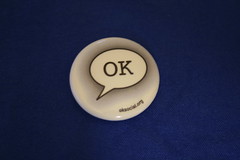So you’ve got a fresh, new small business prospect. He runs a small chain of fitness centers and he wants a web site.
His business also fits right into your niche market. You ask (innocently) how much do you want to spend? He gets mad. Or he doesn’t know. You get annoyed. So does he.
What went wrong here?
The problem isn’t that the client is dumb. The problem is that he has no frame of reference. He doesn’t know what a site costs, because it’s not a common expense for him. He has no idea if you’re overcharging or undercharging.
The budget question is common and ordinary in larger agencies and businesses, but it’s not so common for small businesses.
The way to get around this is not to ask the question at all. Instead, ask your client questions that he can answer.
Questions to ask
What should the site do? What do you want to accomplish? Is it a “brochure” or will it have e-commerce?
Will you be updating the site regularly? Will there be a blog? Or Is it a static site?
Are you going to host videos or podcasts?
Will other people from outside the company be involved?
How will they measure the result?
Explain some simple and complicated projects you’ve done, what each option cost (and why). Use Olympic pricing.
Evaluating the answers
Use the answers to find out if this client is a good fit for your skills and your business. Does he need something you don’t provide? Are his expectations realistic? Does this project fit with past projects you’ve done? Or is it way outside of your comfort zone (that can be good, or it can be a warning sign).
What are his expectations about timing and the number of revisions you’ll do?
What payment schedule does he expect?
Does he have previous experiences hiring freelancers? And are you the first person working on this particular project? If your predecessor didn’t work out, what happened?
Educate them. You’ll both be happier (and smarter).







